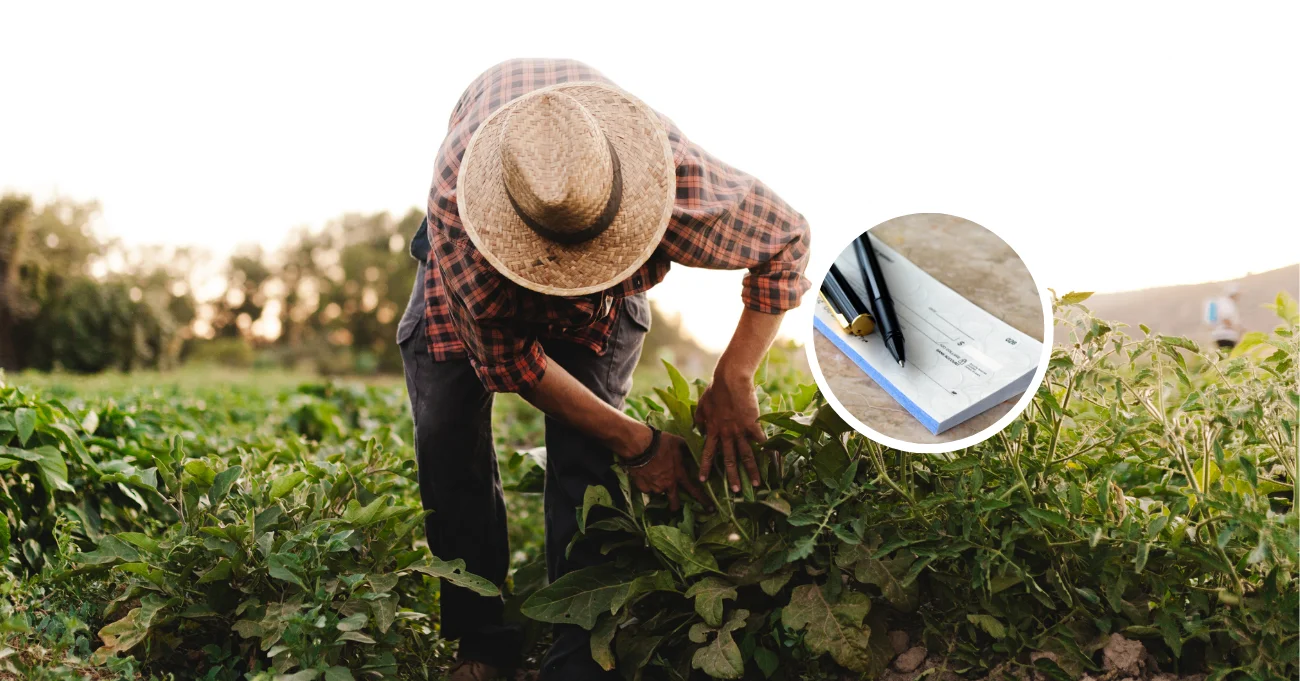The Black Farmers Settlement marks an important moment in the fight to address systemic discrimination against Black farmers in the United States. These injustices, perpetuated for decades through discriminatory practices by the USDA, devastated families and stripped many of their farming legacies. The Inflation Reduction Act of 2022 aims to rectify these wrongs by allocating billions in reparative payouts. However, one pressing question remains: “When will the Black Farmers Settlement checks be mailed?”
At Sparrow, we specialize in navigating the complexities of class action settlements, ensuring claimants receive accurate guidance on eligibility, timelines, and filing requirements. With our support, individuals affected by discrimination—such as those waiting for the USDA discrimination lawsuit payout date—can confidently pursue their claims.
Leveraging our years of experience, we will explore everything you need to know about the Black Farmers Settlement 2024 payout date. From eligibility requirements and the claim process to expected timelines and the impact of this historic payout, we’ll provide clarity and actionable guidance for all claimants.
Let’s get started.
Overview of the Black Farmers Settlement
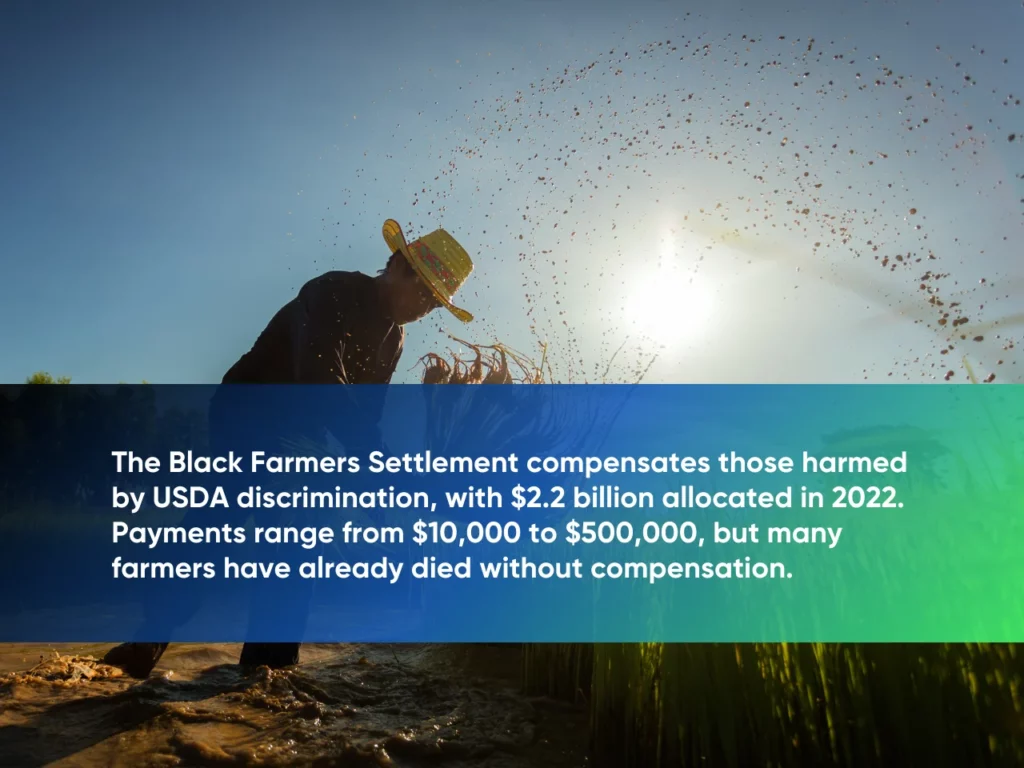
The Black Farmers Settlement addresses decades of USDA discrimination that unfairly targeted Black farmers. These discriminatory practices, such as direct loan rejections and excluding farmers from crucial programs, caused widespread financial losses and land forfeitures. This has left many asking: when will the black farmers settlement checks be mailed?
This settlement builds on the foundation laid by Pigford v. Glickman, a 1999 lawsuit that sought to compensate farmers who faced USDA discrimination. While Pigford resulted in some payouts, thousands of eligible farmers were left out due to stringent filing requirements and missed deadlines.
Fast-forward to 2022, when President Joe Biden signed the Inflation Reduction Act, allocating $2.2 billion to address these ongoing disparities. Of this, $1.5 billion is earmarked for Black farmers. Payments range from $10,000 to $500,000, depending on the severity of harm and supporting documentation provided.
Advocates like Tracy Lloyd McCurty, Executive Director of the Black Belt Justice Center, have praised the settlement as “a hard-fought, bittersweet victory.” While it offers critical relief to many, thousands of farmers who were affected by discrimination have already passed away without receiving compensation.
Allegations Against the USDA
Does the USDA discriminate against farmers of color? The Black Farmers Settlement stems from decades of claims and legal findings that highlight systemic issues against Black farmers by the USDA. These allegations are supported by historical data and testimonies, indicating that Black farmers were disproportionately excluded from critical financial and programmatic resources, leaving many unable to sustain or grow their farming operations.
Claimants alleged that the USDA engaged in systemic discriminatory practices, including:
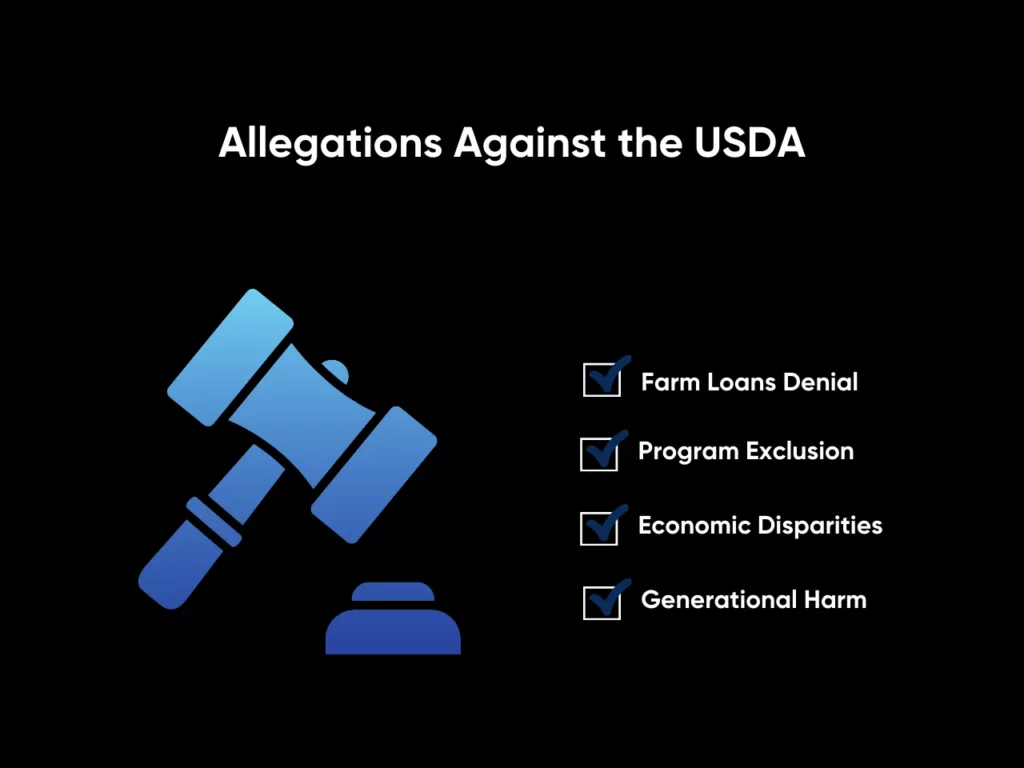
- Farm Loans Denial: Black farmers were disproportionately denied USDA loans, often without explanation, leaving them unable to maintain or expand African American farming operations. This high overall rejection rate forced many into financial instability and foreclosure, eroding their ability to sustain their farms.
- Program Exclusion: Black farmers were systematically excluded from USDA programs, such as grants, subsidies, and disaster relief initiatives. Delays in processing applications or outright denials meant many Black farmers missed out on crucial technical assistance available to others.
- Economic Disparities: Discriminatory policies led to a dramatic 90% decrease in Black-owned farmland between 1910 and 1997. Many from the African American community lost their land due to financial challenges exacerbated by the USDA’s inequitable practices.
- Generational Harm: The widespread loss of land and federal resources significantly impacted Black farming families, stripping them of opportunities to build and transfer generational wealth.
The Black Farmers Settlement seeks to address these allegations by providing financial restitution to those who suffered under these practices, marking an essential step toward justice and accountability.
Timeline of Legal Proceedings
The Black Farmers Settlement has followed a complex timeline involving legislative action, advocacy, and procedural developments. As the settlement process unfolds, several key milestones have been reached:
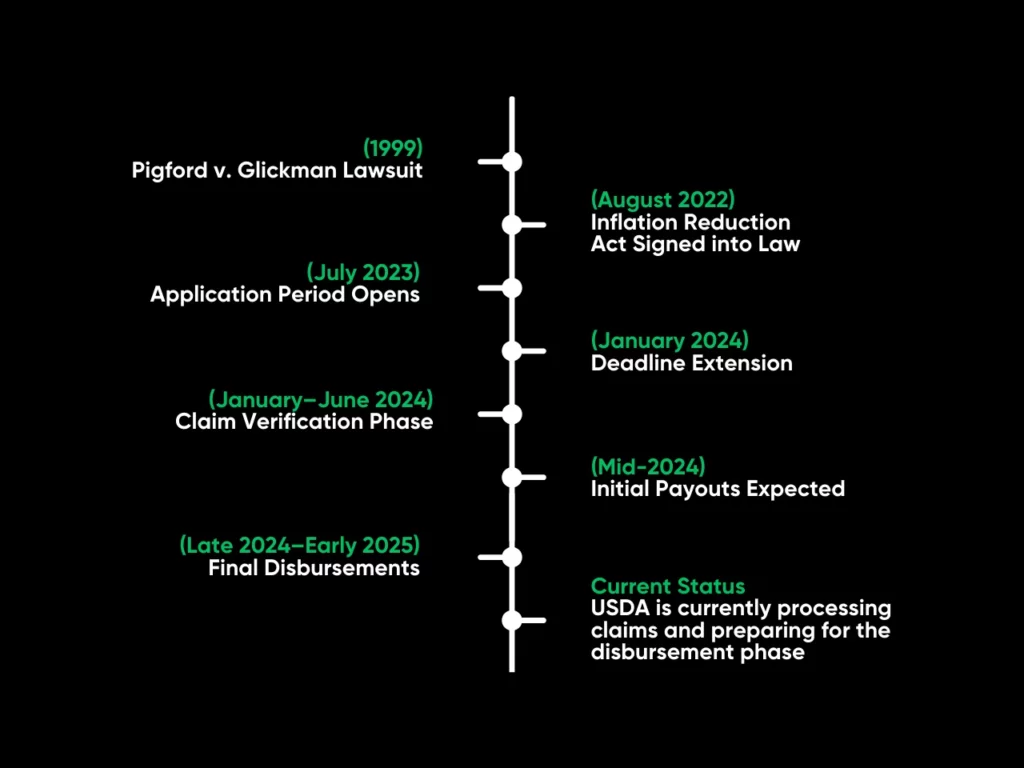
- Pigford v. Glickman Lawsuit (1999): The groundwork for the Black Farmers Settlement was laid with the landmark Pigford v. Glickman case. Black farmers filed a class action lawsuit against the USDA, alleging high direct loan rejection rates due to systemic discrimination. The case resulted in a $1 billion settlement, but strict filing deadlines excluded many farmers, sparking demands for additional reparations.
- Inflation Reduction Act Signed into Law (August 2022): President Biden passed the Inflation Reduction Act, allocating $2.2 billion to address discriminatory USDA practices. Of this amount, $1.5 billion was designated for needy Black farmers, marking a significant step toward reparative justice.
- Application Period Opens (July 2023): The USDA began accepting claims for financial relief under the settlement. Outreach efforts targeted affected farmers to ensure they could submit the necessary documentation to qualify.
- Deadline Extension (January 2024): Recognizing the high volume of potential claims and barriers to access, the USDA extended the application deadline to January 2024, giving claimants additional time to file.
- Claim Verification Phase (January–June 2024): After the deadline, the USDA entered a claim verification phase to review submitted applications, confirm eligibility, and resolve disputes. This step ensures that only valid claims are processed for payouts.
- Initial Payouts Expected (Mid-2024): The first wave of checks was expected to be mailed in mid-2024, prioritizing applications with minimal disputes or additional requirements.
- Final Disbursements (Late 2024–Early 2025): Due to the scale of the financial assistance program, the USDA anticipates completing all payments by early 2025. This extended timeline accounts for the high number of claims and the complexity of processing them.
- Current Status: The USDA is currently processing claims and preparing for the disbursement phase. Ongoing challenges, such as advocacy for the inclusion of heirs of deceased farmers, may affect the overall timeline. Despite delays, the settlement is progressing toward providing long-overdue compensation to Black farmers.
Impact on Black Farmers and Their Families
The Black Farmers Settlement provides critical financial relief to thousands of Black and minority farmers who have faced systemic discrimination by the USDA for decades. This attack of discrimination often took the form of denied loans, delayed applications, and inequitable foreclosure practices, leaving many farmers unable to sustain or expand their operations.
The Biden administration has distributed over $2 billion in direct payments as part of this settlement, with amounts ranging from $10,000 to $500,000 for more than 23,000 farmers. An additional 20,000 aspiring farmers who were denied USDA loans received $3,500 to $6,000 each. Most payments have gone to farmers in historically underserved areas such as Mississippi and Alabama.
USDA Secretary Tom Vilsack emphasized that these payments represent an acknowledgment of the USDA’s history of discrimination but are not intended to fully compensate for the losses or pain endured by affected farmers.
Financial and Emotional Toll
Farmers like Wardell Carter, whose family was denied loans since 1939, recall how systemic barriers left them farming with a horse and mule instead of tractors. Without access to funding, their farming capacity was drastically limited, resulting in years of reduced profits. Now 65, Carter plans to use his payout to restore the family farm so that his nephew can continue their legacy.
For others, like President of the National Black Farmers Association John Boyd Jr., the fight continues. While Boyd acknowledges the settlement as a positive step, he stresses that it’s insufficient to address the scale of harm endured by the historically underserved customers. “We want our land,” Boyd stated, advocating for broader measures like 120% debt relief, which was initially included in the COVID-19 stimulus package but was blocked by lawsuits.
Expected Timeline for Settlement Checks
When will the black farmers settlement checks be mailed? Settlement checks for the Black Farmers Settlement are expected to be mailed starting mid-2024, following claim verification, with final payments completed by early 2025.
The USDA is prioritizing timely distribution while addressing disputes and verifying eligibility, ensuring that questions as to when will the black farmers settlement checks be mailed will finally be addressed. Here’s the expected timeline:
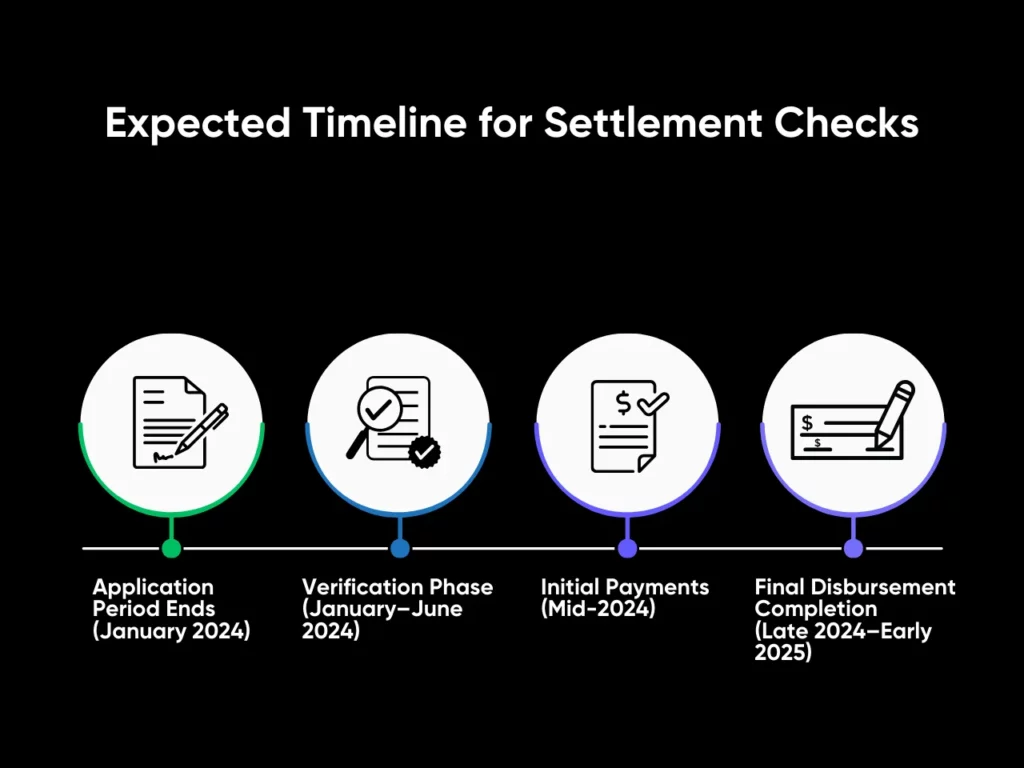
- Application Period Ends (January 2024): The USDA extended the original deadline for submitting claims to January 2024 to allow more farmers to complete their applications. This extension aimed to ensure all eligible claimants had ample time to gather the required documentation.
- Verification Phase (January–June 2024): Once the application period closed, the USDA began verifying claims to determine eligibility and process documentation. This phase involves cross-checking evidence of discrimination and economic harm and resolving disputes over eligibility.
- Initial Payments (Mid-2024): The USDA announced that the first checks are expected to be mailed in mid-2024. These payments were intended to prioritize applications submitted early and that met all eligibility requirements without complications.
- Final Disbursement Completion (Late 2024–Early 2025): Due to the sheer number of applications and the complexity of processing them, the USDA anticipates that the final round of payments will be completed by early 2025. This extended timeline accounts for appeals, disputes, and the need to address any errors in the initial payout process.
Eligibility and Claim Process for Black Farmers
Who is eligible for the Black Farmers Settlement? The settlement aims to compensate Black farmers under the Inflation Reduction Act’s Discrimination Financial Assistance Program (DFAP), focusing on direct loan applicants who were denied equitable access to the nation’s land and USDA farm lending programs.
Eligible applicants must meet specific criteria to qualify for financial relief and follow the established claim process. Here’s how eligibility and the claims process work:
Eligibility Criteria
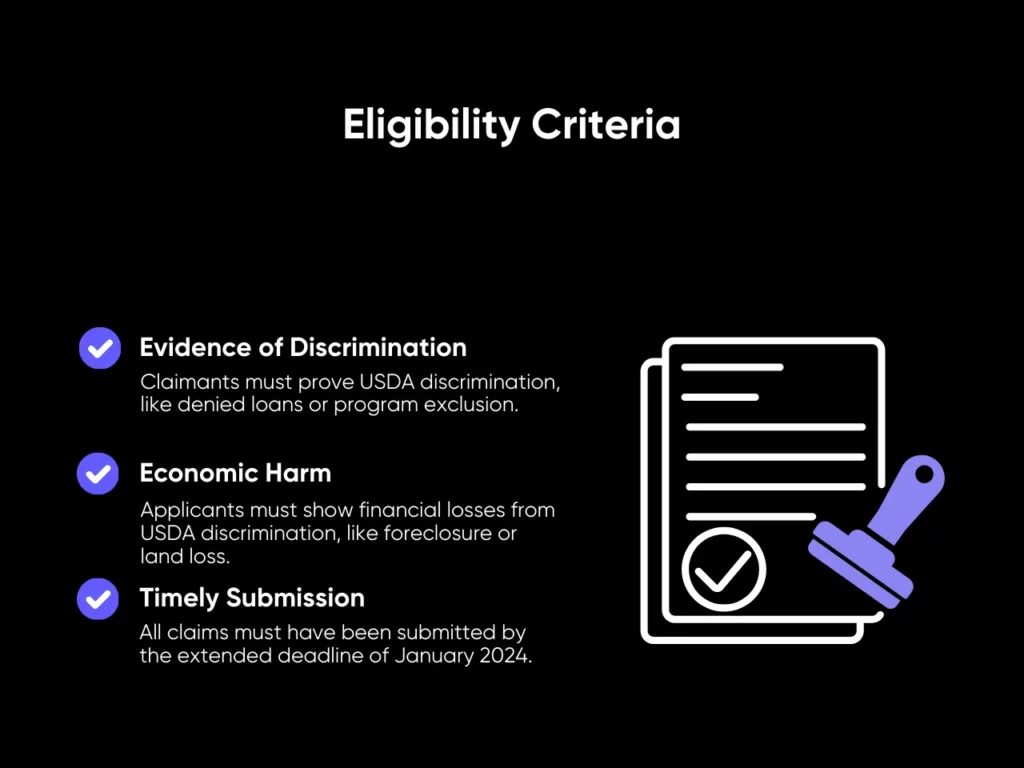
- Evidence of Discrimination: Claimants must demonstrate that they or their families experienced discriminatory practices by the USDA. This includes denied loans, exclusion from farm loan programs, or other inequitable treatment.
- Economic Harm: Applicants must provide evidence of financial losses directly tied to USDA discrimination, such as foreclosure, loss of farmland, or reduced farming capacity.
- Timely Submission: All claims must have been submitted by the extended deadline of January 2024 to be considered in the current settlement phase.
Claims Process
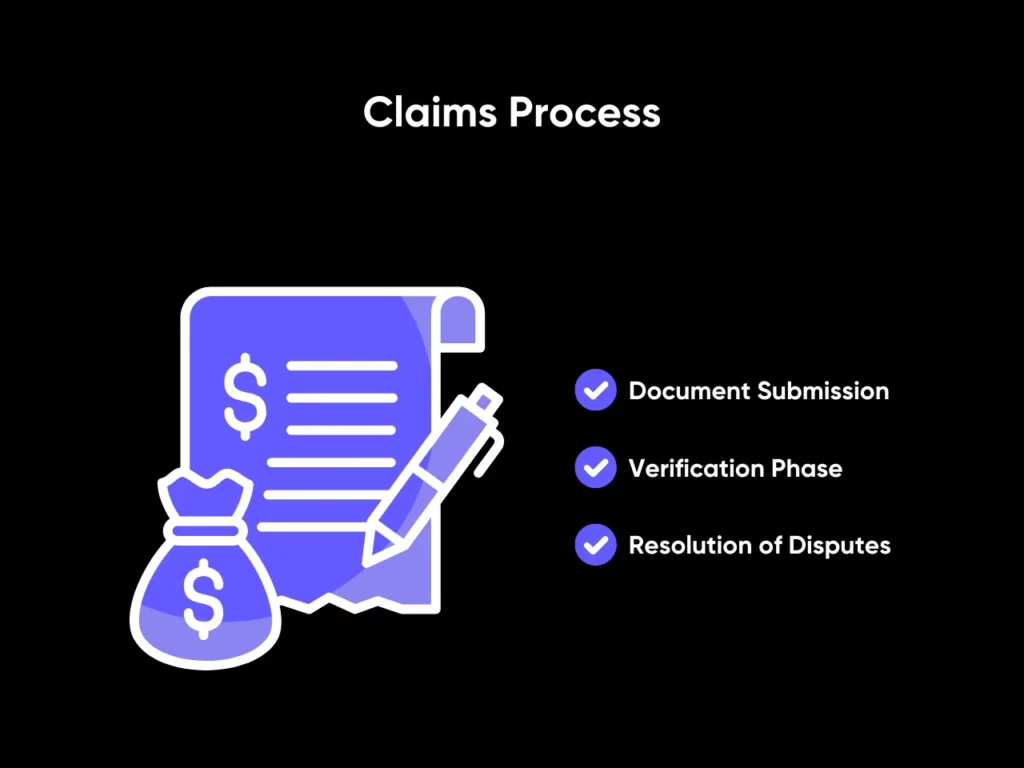
- Document Submission: Eligible claimants were required to submit detailed documentation, including records of denied USDA loans, financial harm, or exclusion from the federal government’s programs. These records form the foundation for verifying each claim.
- Verification Phase: Once applications were submitted, the USDA began a thorough review process, verifying eligibility and cross-checking documentation against program requirements.
- Resolution of Disputes: For claims with incomplete or contested documentation, the USDA has established a process to resolve disputes and ensure that qualifying applicants are not excluded from the settlement.
USDA’s commitment is to process claims efficiently while maintaining the accuracy and integrity of the review process. Farmers who meet the eligibility criteria and have successfully submitted their claims can anticipate receiving financial relief as part of this historic settlement.
Key Takeaway
The Black Farmers Settlement marks a bittersweet milestone in addressing decades of systemic USDA discrimination. While billions have been allocated to provide restitution, many eligible claimants are left asking, “When will the black farmers settlement checks be mailed?” This settlement offers both financial relief and recognition of generational harm caused by inequitable policies, but justice remains delayed for many families.
As the mid-2024 payout target nears, claimants must stay informed about the claim verification process. Challenges like proving economic harm, submitting proper documentation, and resolving disputes may delay payments. For heirs of deceased farmers or those with incomplete claims, navigating these complexities will require extra diligence to avoid setbacks.
Need updates on the Black Farmers Settlement? Sparrow provides clear guidance on filing a class action lawsuit, helping you stay ahead of the process. With expertise in class actions, we’re here to ensure you receive the compensation you deserve. Follow Sparrow’s blog for insights into this landmark case and other important legal developments.
